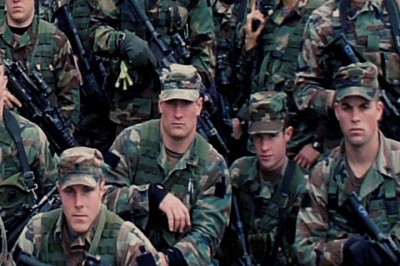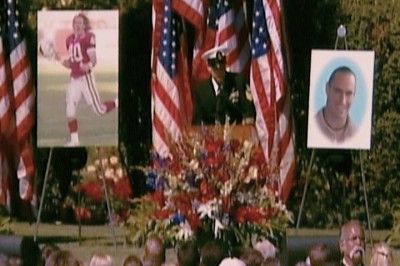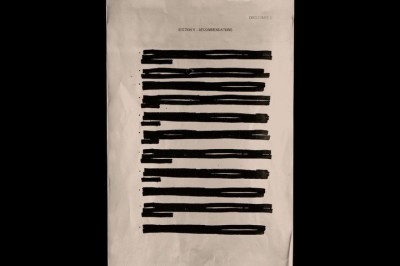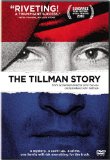| Reviews & Columns |
|
Reviews DVD TV on DVD Blu-ray 4K UHD International DVDs In Theaters Reviews by Studio Video Games Features Collector Series DVDs Easter Egg Database Interviews DVD Talk Radio Feature Articles Columns Anime Talk DVD Savant Horror DVDs The M.O.D. Squad Art House HD Talk Silent DVD
|
DVD Talk Forum |
|
|
| Resources |
|
DVD Price Search Customer Service #'s RCE Info Links |
|
Columns
|
|
|
Tillman Story, The
By now there's few who have not heard the story of former National Football League player Pat Tillman and his decision to abandon the league that was willing to pay him millions for service in the Army in the wake of the September 11 attacks. Many are familiar with his death because of friendly fire in Afghanistan in 2004, but hopefully people are aware of the contortions that were performed to frame the narrative of his death for perception. If not, The Tillman Story recounts some of those things and more, and if you are familiar with the story or the military environment, it is likely to make you frustrated all over again.
The documentary film was directed by Amir Bar-Lev, his follow-up work to his 2007 work My Kid Could Paint That. Narrated by Josh Brolin (No Country for Old Men), the film's title covers two different components of Tillman, both of which in measures of poignancy and substance. Tillman's life in California growing up with his brothers Kevin and Richard is recounted by the latter, who also happens to be the youngest brother. Tillman's father (Pat Sr.) and mother (Marie, a.k.a Dannie) talk about Pat's childhood and college years, and those who served with and under Tillman recall his time training with the Rangers and out in country, first in Iraq (when Tillman's company was part of the then-heralded rescue of Private First Class Jessica Lynch) then in Afghanistan near the Pakistan border. The other component of Tillman recounts the lengths and measures that his chain of command took to make the death appear less of an accident and more a final act of courage from a supremely heroic human being.

It is the latter in which the feature proves to be effective and maddening. Upon the announcement of Tillman's death, Tillman's wife received two bereavement officials to her home. It was later discovered that not only were they not serving this function, but they were there to attempt to convince her to make Tillman's funeral one replete with military honors, a request that went explicitly against his wishes as we later see in paperwork that Tillman filled out as part of his entry processing into the Army. The initial story about Tillman's death (that it was due to a Taliban ambush) was proved weeks later to be false by the Army's admission, though their reticence about the details remained. It took the efforts of the family, mainly Dannie trying to literally fill in the blanks behind the scores of redacted documents given to the family by the Army to learn more about the case and the things that occurred in the aftermath of Pat's death. Why were those who fought near (or in Bryan O'Neal's case, next to) Tillman being told to keep quiet or (in the case of Russell Baer) being put on a plane next to Tillman's brother Kevin and told to escort both back to their hometown and tell them nothing about what happened? Why were Tillman's fatigues, body armor and even his journal burned after his death? These are some of the details that come from what's raised in Dannie's research, though it takes a tersely worded letter from Pat Sr. to trigger an Inspector General's investigation which eventually accused a loyal staff officer of misdirection, and to date seems to be where the culpability has ended in the Army's eyes.

There are many moments where the film and its interview subjects get an opportunity to dispel either the Tillman myth or the notion that everyone joins the Army out of respect for service to the country. Baer explains that he joined the Army for college money, a reason that I would be willing to bet is more prevalent than people give it credit for. There are not jabs at those who blindly went into the Army as a result of 9/11, but when it comes to Baer, he has his reasons much like Pat Tillman did, and they are a little more cynical than some. Tillman's reasons for joining the Army remain private among himself, Kevin and Pat's wife Marie, but they do appear to be decidedly NOT as a result of 9/11. O'Neal's reason for joining would apparently be different than Tillman's or Baer's, but to see both O'Neal and Baer be virtually bullied or coerced into silence by people who had no connection to the incident where Pat Tillman was killed remains reprehensible and obscene regardless of how any other optics have changed. Additionally, the effort to make Lieutenant General Philip Kensinger the scapegoat in the effort to revise the details of Tillman's death is nauseating. Kensinger was the one who appeared before the press weeks after the incident and provided details as to the truth. In Kensinger's world, where he had served for more than 30 years with distinction and honor, seeing his name besmirched in his then-recent retirement for the sake of preserving the reputations of other officers is pathetic, yet sadly nothing new.
As one who was familiar with officers acting in a less than honest fashion for much smaller events, what goes on by four-star generals in The Tillman Story angered but doesn't necessary shocked me. If you can get commanding officers to employ ways to distort company efficiency and fitness reports get quietly shuffled away to other companies (only to later receive promotions returning them to command even more soldiers than they did before), then you can manufacture story like the one that was created in the wake of the Tillman death. To see people like then-Lieutenant General Stanley McChrystal, those in the Joint Chiefs of Staff or even then-Defense Secretary Donald Rumsfeld deny that they had knowledge of, nor any stake in the actions that spun and eventually backtracked from the story about Pat's death is laughable if it wasn't so tragic.

That said, the film seems to lack some focus or direction when it comes to guilty parties. Sure, Dannie believes that Rumsfeld had some knowledge of this cover-up, but the film does not help itself by showing the chain of command all the way up to George W. Bush and speeches that glossed over the details of Tillman's death. It is almost as if the Bush footage was designed to be inflammatory and elicit a response, when the details surrounding the cover-up are outrageous enough. Incorporating Dubya into this somehow gives Bar-lev a chance to make this documentary even more legit when in fact it hampers it.
Ultimately, The Tillman Story on its own is compelling and must-see viewing. It did not resonate as soundly with me as it will with other people because to a very minor degree I'm in "been there, done that" territory. Sadly, guys like Phil Kensinger, Russell Baer and Bryan O'Neal aren't and they're the ones who have to pay the emotional scars of what happened while everyone else continues to walk away free of any rightful blame.
The Disc:The Video:
The Tillman Story is presented in 1.78:1 anamorphic widescreen. The feature juggles a variety of sources fairly well, ranging from Pat's wedding ceremony on video to the glossier film sources from the NFL Films coverage of the family receiving honors at several different stadia on behalf of their son. The interviews are filmed and are handled well, with film grain present during those shots and a natural looking image without little in the way of image enhancement to be distracted by.
The Sound:I was a little surprised that there was a Dolby Digital 5.1 surround track for this dialogue-driven documentary, but it sounds OK and avails itself well. The title track from Neil Young's "Hawks and Doves" album comes through clear as a bell and the newsreel footage that shows some of the nighttime bombing in Iraq even has a taste of low-end from the subwoofer. That said, there's no noticeable action in the rear channels and the interviews/footage comes almost exclusively through the front channels, but there's little to complain about.
Extras:Save for some trailers to Sony titles, the only extra is a commentary from Bar-Lev that is both understated in tone yet doesn't provide any breathtaking new information about the film. Sure, he provides requisite thoughts on the family, interview subjects and some deleted scenes (along with a neat story as to how Brolin helped with the production), but past that there isn't much to be gleaned from listening to the track. In his defense, the film does tend to speak for itself.
Final Thoughts:For those who haven't seen The Tillman Story, you owe it to yourself to look at Pat Tillman's life and death in what may arguably be it's most candid and maddening at the same time. The lengths that are undertaken to preserve a legacy that the subject neither wanted nor requested is astounding. From a technical and supplemental point of view, it's nothing special, but the film is the star and it gets its due.
|
| Popular Reviews |
| Sponsored Links |
|
|
| Sponsored Links |
|
|
| Release List | Reviews | Shop | Newsletter | Forum | DVD Giveaways | Blu-Ray | Advertise |
|
Copyright 2024 DVDTalk.com All Rights Reserved. Legal Info, Privacy Policy, Terms of Use,
Manage Preferences,
Your Privacy Choices | |||||||














